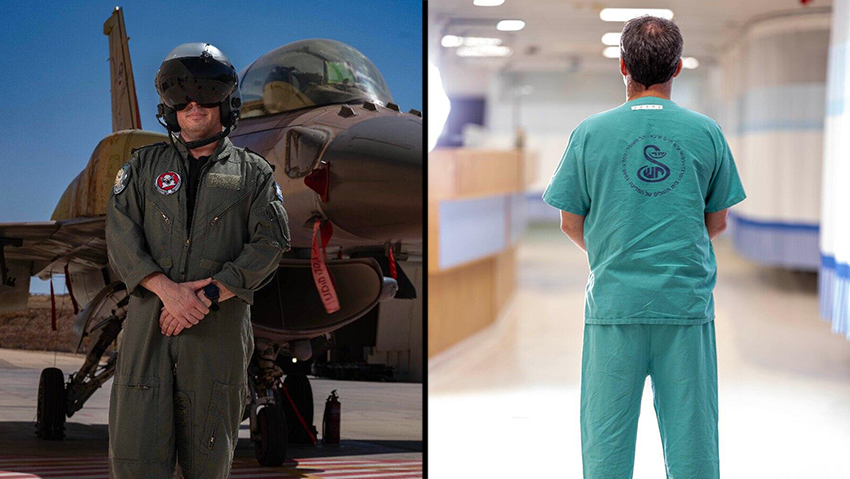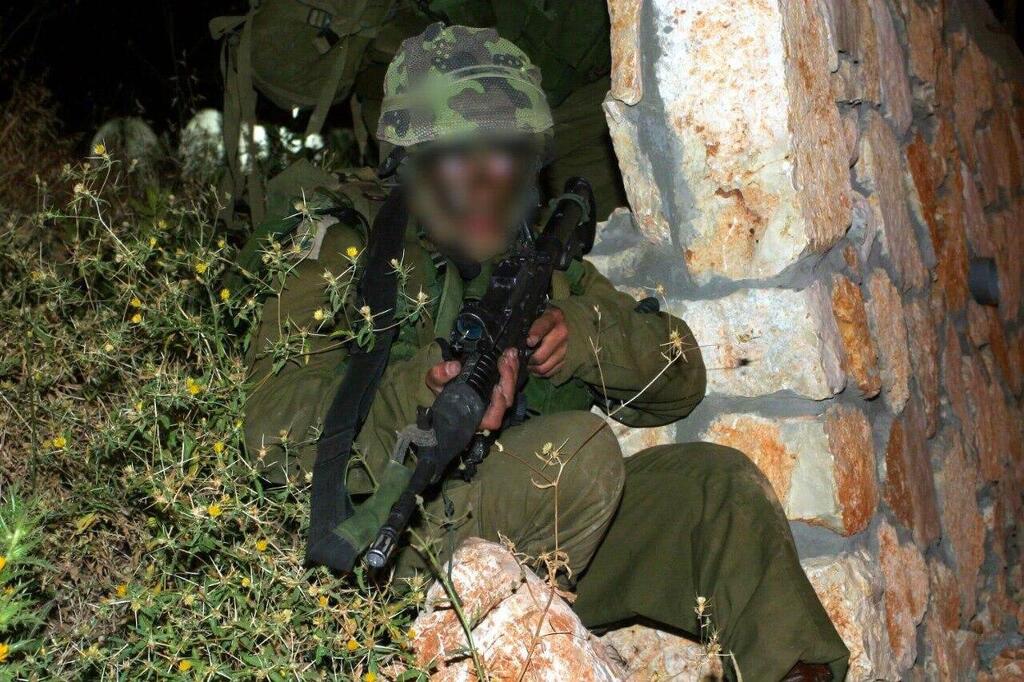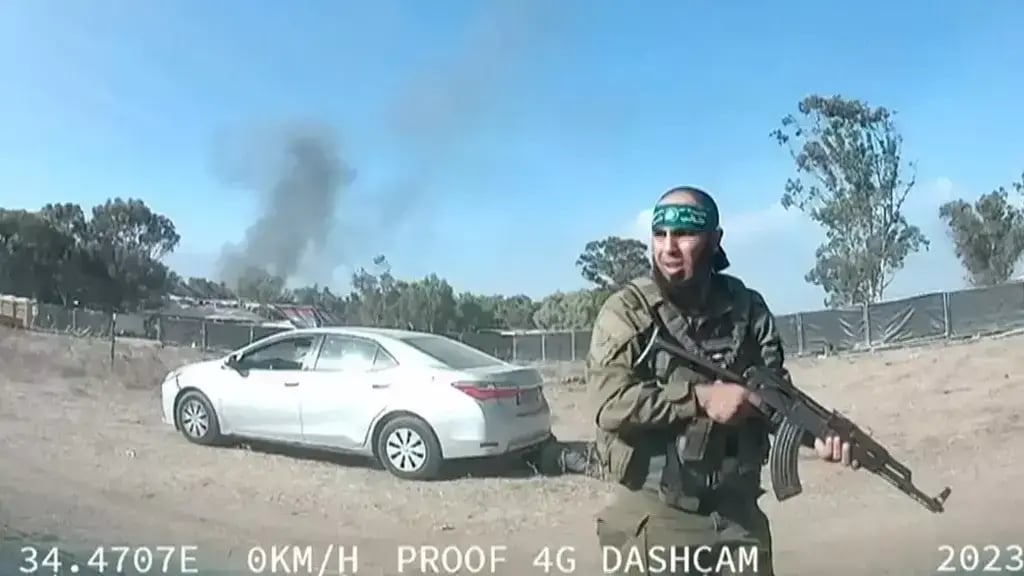Getting your Trinity Audio player ready...
On the morning of October 7, Major (res.) Dr. D embarked on what seemed like a routine shift at the hospital. In his green scrubs, he made himself a cup of coffee—then the sirens blared.
"Seems like an operation in Gaza is about to start," he told his wife as they retreated to their safe room in Yavne. "I'm heading to the hospital to relieve the duty officer, and later today, I might be called to the squadron."
Dr. D isn't just a surgical resident at Sheba Medical Center; he's also a combat navigator for the F-16i Sufa squadron at Ramon Air Base. This unique dual role, which revealed its profound interconnectedness that morning, demanded immediate action.
"By seven, as the situation became clear, I told my wife, 'I'm heading to the squadron.' I changed into my flight jumpsuit, but five minutes later, the hospital called: 'There's an urgent surgery. You should come in early.' I switched back to my scrubs, and moments later, the squadron called: 'Get here as fast as you can.'"
And so, Dr. D dashed to Ramon Air Base. "I was among the first to arrive, went straight into operations and was assigned a plane. Within half an hour, we were airborne."
Many wonder where the Air Force was that morning. "I can assure you, the Air Force's mobilization was tremendous. Everyone who was called, and even those who weren't, arrived swiftly."
Were the missions relevant, targeting Hamas headquarters in Gaza or terrorist convoys headed to border communities?
"I can't disclose details, but the answer is within your question."
Let me ask differently: Do you feel you saved lives that day?
"Damn right, I do ."
Starting as an officer in the Paratroopers, Dr. D flew two sorties that Saturday and has since participated in over 120 offensive and defensive missions. "Point to a spot on the map where the Air Force operates—and I can tell you we've been there."
He served continuously until February but has been splitting his time between the cockpit and the operating room since. "There were days when I'd perform surgery in the morning and head to the squadron in the afternoon."
When we met Dr. D at the hospital, he had just finished a six-hour-long surgery. At the squadron, as our interview concluded, he was called for an urgent sortie. He refused to disclose the target: perhaps Gaza, maybe Lebanon or maybe, another location.
At 42, married and a father of two daughters ("My wife, Maya, is the real powerhouse"), he grew up in Bat Yam and Rishon Lezion. Dr. D dismisses the notion of "privileged pilots" with disdain: "My mother is a bank clerk, my father is a retiree who was a menial worker all his life."
Holding two of the most prestigious titles—pilot and doctor—he doesn't consider it anything special. "I sit in traffic like everyone else, shop at the supermarket like everyone else, cook and do the dishes." During our conversation, he was even scolded for running the washing machine at the wrong speed.
Heart emoji
In his youth, he dreamed of being a pilot but wasn't accepted into the course. He enlisted in the paratroopers, fought as a squad commander during Operation Defensive Shield, attended officer school, and returned to the battalion as a platoon leader. After four years, he tried again—this time succeeding and completing the course as a combat navigator.
A decade later, he decided to test his luck with medical school—and wasn't accepted on his first attempt. "In both cases, I wasn't prepared enough," says Dr. D. "I think if I had joined the pilot course at 18, I wouldn't have finished it. Every success in my life started with failure."
Eventually, Dr. D was accepted into medical school and is now in his second year of surgical residency. He sees a resemblance between combat flying and surgery: "Both push you to the edge and require precision, responsibility, decision-making under pressure, and the ability to handle failure. You get no points for almost. Either you hit it, or you didn't. If you weren't precise in altitude, you crashed—if you cut a blood vessel a millimeter off, the result could be catastrophic."
Additionally, Dr. D notes, "Both professions involve sharp transitions on the spot. You're on standby at the squadron, making an omelet, and suddenly there's a siren—and within minutes, you're airborne. You cross into another country and suddenly, you're hit by a missile and eject. Ten minutes ago, you were making an omelet, and now you're hanging by a parachute over enemy territory. The same goes for medicine: a patient who was stable suddenly crashes, and you find yourself in an intense resuscitation in the middle of the calmest shift."
Flying, Dr. D says, has enhanced his medical professionalism. "The briefing and debriefing culture from the Air Force significantly helped my development as a surgeon. Initially, I'd ask colleagues to film everything I did in surgery so I could debrief myself. In the Air Force, we use simulators extensively, so I built myself a surgery simulator at home. A shoebox, some Velcro, a few tubes—and it significantly improves you."
Dr. D also treats wounded soldiers. "There's no difference between an 80-year-old or a 20-year-old patient," he says. "We give everyone the best care. But yes—when it's a soldier, you feel an emotional storm. So, you visit him in the middle of the night, ask how he got injured, and share a bit about your background. We're in the same boat, whether you're a paratrooper or an F-16 navigator."
Balancing between the squadron and the department, Dr. D barely sees home. "Throughout the war, I've received full support from Sheba, allowing me to maintain balance across these three worlds."
He read me a WhatsApp message he sent to his parents after the Iranian attack: "When we finished the briefing at the squadron and understood the weight of the moment—my entire life story converged into that moment, for which I went through everything I did. Although you weren't there, every life path you're part of was interwoven there. Thank you, you're part of it."
How did they respond?
"Heart emoji."
First published: 18:08, 09.09.24





